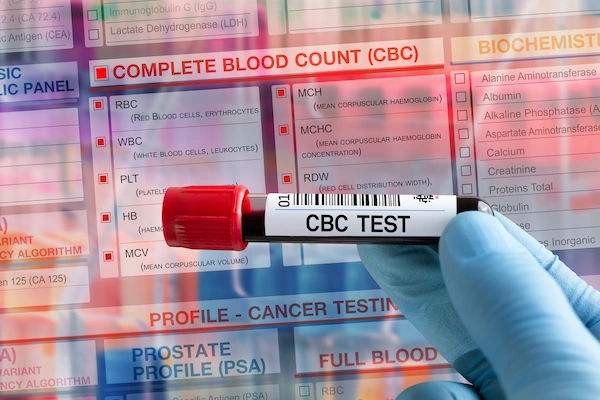CBC Test Checklist for Elderly Patients
Understand why a CBC test is vital for elderly patients. Get a checklist of key considerations, common findings like anemia or infection, and how results guide care for seniors' health.

Written by
Last updated on 18th Jul, 2025

As we age, our health needs change, and so does the way our body functions. Routine lab tests become an important part of staying healthy and catching problems early. One of the most useful and commonly recommended tests for adults over 60 is the Complete Blood Count, or CBC. The CBC is a simple blood test that provides valuable information about your overall health. It measures different components of your blood, including red and white blood cells and platelets. This can help your doctor detect conditions like anaemia, infections, and even early signs of some cancers, often before symptoms appear. Because many age-related health issues develop gradually and without clear warning signs, a CBC test offers a practical way to monitor your health regularly.
In this guide, we’ll explain what the CBC test shows, why it matters for older adults, and how it can support healthy ageing.
Why CBC Matters for Elderly Patients
As we age, our bodies undergo natural changes that can affect our blood components and overall health. A CBC test is particularly valuable for seniors because it can help:
- Evaluate Immunity: The immune system can weaken with age, making seniors more susceptible to infections. The WBC count and differential provide insights into the immune system's ability to respond.
- Screen for Anaemia: Anaemia (low red blood cell count or haemoglobin) is common in older adults and can cause significant fatigue, weakness, and impact cognitive function. A CBC is the primary tool for detecting anaemia.
- Identify Potential Early Signs of Cancer: Abnormalities in white blood cell counts or the presence of immature cells can sometimes be early indicators of certain blood cancers (like leukaemia) or other bone marrow disorders.
- Assess Nutritional Status: Red blood cell indices can hint at deficiencies in vitamins like B12 or folate, which are crucial for overall health.
- Monitor Chronic Conditions: For seniors managing conditions like kidney disease, heart disease, or chronic inflammation, a CBC can provide important information about how these conditions are affecting blood health.
Book Complete Blood Count (CBC)
When to Consider a CBC for Elderly Patients
Your doctor will likely include a CBC as part of your routine annual health check-up. However, you should specifically discuss getting a CBC if you experience:
- Persistent Fatigue or Weakness: If you feel unusually tired, even after adequate rest, or have a general lack of energy.
- Frequent or Recurrent Infections: If you seem to catch illnesses more often, or if infections are harder to clear.
- Unexplained Weight Loss: Any unintentional weight loss should always be investigated.
Pale Skin or Dizziness: Possible signs of anaemia. - Unexplained Bruising or Bleeding: If you bruise easily, have frequent nosebleeds, or have unusual bleeding.
- As part of your annual health check-up: Even without specific symptoms, a CBC provides a crucial baseline for monitoring age-related changes.
- Before or after surgery: To assess your body's ability to handle stress and heal.
Being proactive about these tests empowers you to identify and address potential health concerns early, leading to more effective management and better long-term outcomes.
How Often Should Elderly Patients Get Tested?
For most seniors aged 60 and above, an annual CBC test is often recommended as part of their comprehensive health check-up. This regular screening helps establish a baseline and allows your doctor to monitor trends over time. However, the exact frequency can vary based on your individual health status, any existing medical conditions, specific risk factors, and your doctor's recommendations. If you have a chronic illness or higher risks, your doctor might suggest more frequent testing (e.g., every 3-6 months) to monitor your condition closely. Always consult with your healthcare provider to determine the most appropriate testing schedule for you.
Key Information from a CBC Test: What Doctors Look For
A CBC report will show numerical values for each blood component, along with reference ranges. Your doctor will interpret these results together, considering your age, symptoms, and medical history. Here's a look at what the key markers can indicate in relation to evaluating immunity, screening for anaemia, and identifying potential early signs of cancer in elderly patients:
Red Blood Cells (RBCs) and Related Indices (Haemoglobin, PCV, MCV, MCH, MCHC, R.D.W*)
What they measure: These values indicate the oxygen-carrying capacity of your blood. Haemoglobin is the protein in RBCs that carries oxygen, and PCV (Packed Cell Volume) is the percentage of red blood cells in the blood. MCV, MCH, and MCHC provide details about the size and haemoglobin content of individual red blood cells, while R.D.W* (Red Cell Distribution Width) indicates variation in their size.
What results mean:
- Low levels (Anaemia): A very common finding in older adults, often causing fatigue, weakness, and shortness of breath. Anaemia can be due to iron deficiency, chronic diseases (like kidney disease or inflammation), or vitamin deficiencies (B12, folate). Screening for anaemia is a primary goal of CBC in the elderly.
- High levels (Polycythemia): Less common, but can sometimes indicate dehydration or other underlying conditions that need investigation.
White Blood Cells (WBCs) and Differential (TLC, Neutrophils, Lymphocytes, Eosinophils, Monocytes*, Basophils*, etc.)
What they measure: The total number of WBCs (TLC) and the breakdown into different types (Neutrophils, Lymphocytes, Monocytes*, Eosinophils, Basophils*), including their absolute counts. Each type plays a specific role in fighting different kinds of infections. The Neutrophil Lymphocyte Ratio (NLR) is also calculated.
What results mean:
- High WBC count (Leukocytosis): Often indicates an infection (bacterial, viral, or fungal) or inflammation. In elderly patients, infections might present with subtle symptoms, making WBC count a crucial indicator.
- Low WBC count (Leukopenia): Can indicate a weakened immune system, certain viral infections, or issues with bone marrow production, making seniors more susceptible to infections.
- Abnormal differential or presence of immature cells (Blasts*, Pro-myelocytes*, Myelocytes*, Meta-myelocyte*, Bands*, Prolymphocytes*, Atypical Cells*, NRBCs/100 WBC*): An unusual pattern in the types of WBCs or the presence of immature forms can be an early sign of certain blood cancers (like leukemia or myelodysplastic syndromes) or other serious bone marrow disorders. This makes the CBC a vital screening tool for oncology in the elderly.
Platelet Count and Related Indices (MPV, PDW, PCT)
What it measures: The total number of platelets in your blood, along with their mean platelet volume (MPV), platelet distribution width (PDW), and plateletcrit (PCT).
What results mean:
- Low platelet count (Thrombocytopenia): Can lead to easy bruising or bleeding. In seniors, this might be due to certain medications, nutritional deficiencies, or underlying bone marrow issues.
- High platelet count (Thrombocytosis): Less common, but can sometimes occur after an infection, inflammation, or as a sign of certain blood disorders.
(*Optional Tests: Testing of these is conditional depending on results of other tests)
The results from a CBC test, combined with your symptoms, medical history, and a thorough physical examination, will help your doctor accurately assess your current health status and identify any potential risks. This detailed understanding allows them to create a targeted health plan designed to help you maintain your vitality and well-being in your senior years.
Get These Tests If You've Dengue
Book Your CBC Tests via Apollo 24|7
If your doctor recommends a CBC test as part of your annual health check-up, choosing a reliable and convenient testing service is important. Apollo 24|7 makes this simple by providing accurate lab tests with quick results. This helps you and your doctor understand your health clearly and create a personalised plan to manage your well-being effectively.
Why Choose Apollo 24|7 for Your Health Checkups?
- Comprehensive Test Panels: You can choose to book a standalone Complete Blood Count (CBC) test or opt for a comprehensive package like the Senior Citizen Package, which includes additional checks for kidney function, heart health, bone health, and blood sugar, offering a more complete view of age-related wellness.
- NABL-Accredited Labs: All tests are conducted in NABL-accredited labs, ensuring high-quality and reliable results.
- Home Sample Collection: Enjoy hassle-free testing with sample collection at your doorstep, ideal for seniors or individuals with mobility concerns.
- Easy Online Booking: Schedule your tests in minutes through the Apollo 24|7 app or website, making health management simpler than ever.
- Quick Digital Reports: Receive secure, easy-to-read reports online, ready to review or share with your doctor.
By choosing Apollo 24|7, you get access to dependable, convenient diagnostic services that make it easier to understand and manage your health effectively.
Conclusion
For older adults, a CBC test is a valuable part of routine health care. It offers important insights into your body’s ability to fight infections, screens for conditions like anaemia, and may help detect early signs of more serious illnesses, including some types of cancer.
Understanding what this test measures allows you to take a more active role in your health. A CBC can help your doctor identify changes early, guide necessary treatments, and tailor a care plan that supports healthy ageing. If you're over 60, speak with your doctor about whether a CBC test is right for you. Regular testing can be a simple but powerful step toward maintaining energy, independence, and quality of life.
Get These Tests If You've Dengue
₹398(₹995)60% off
₹360(₹900)60% off
₹280(₹700)60% off
₹280(₹700)60% off
₹670(₹1675)60% off
₹670(₹1675)60% off




.webp)